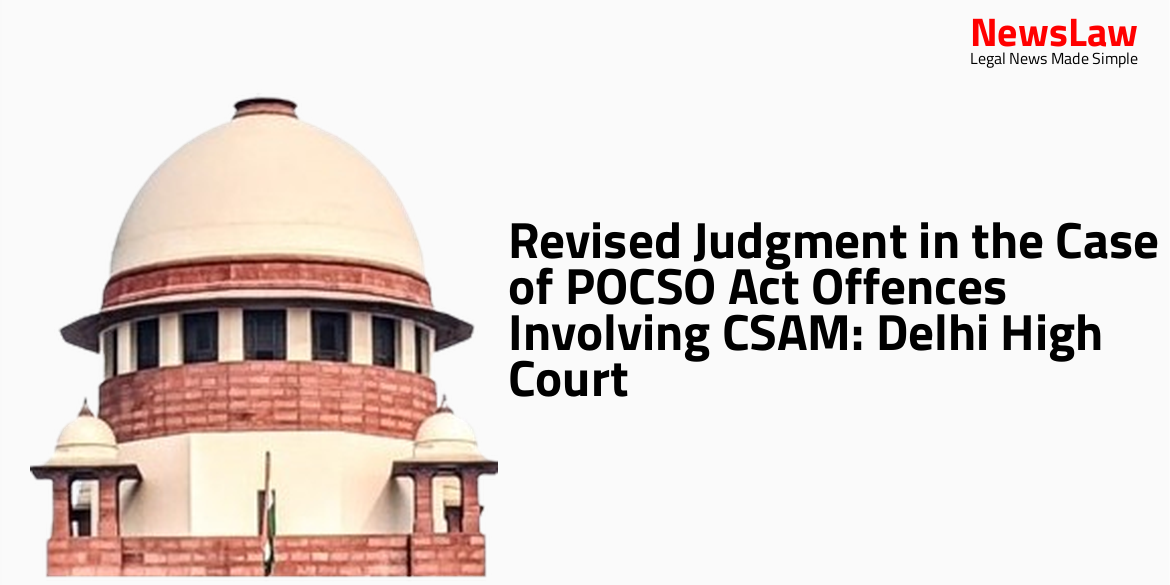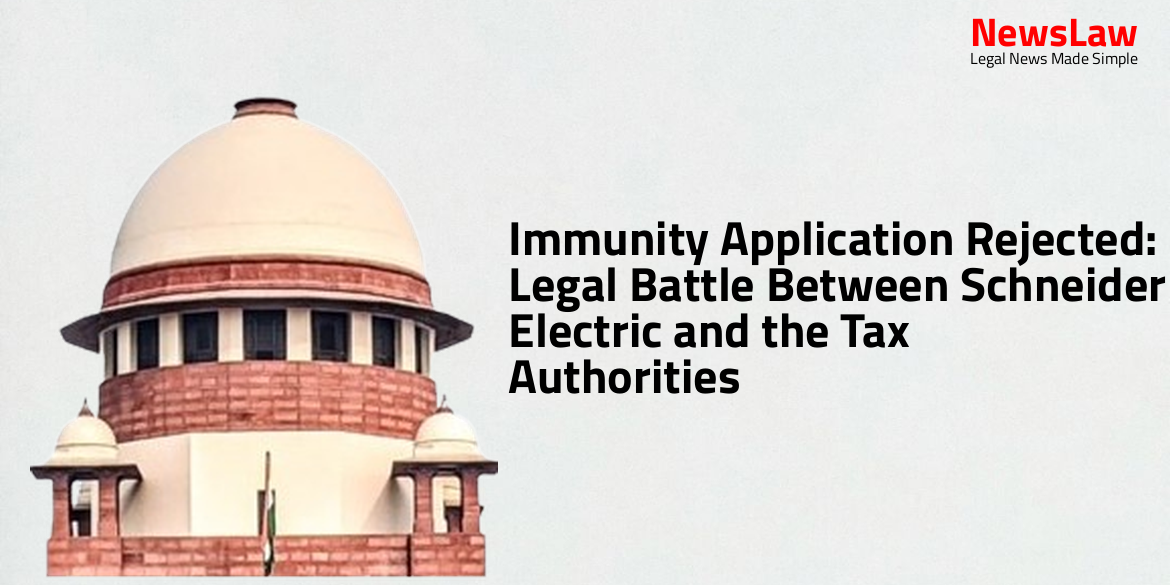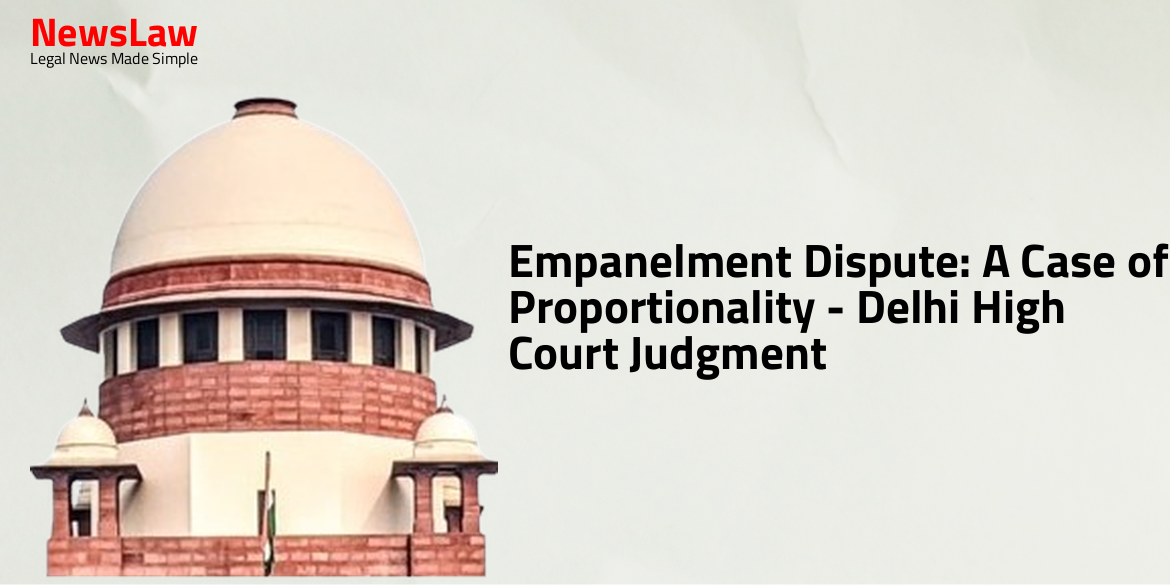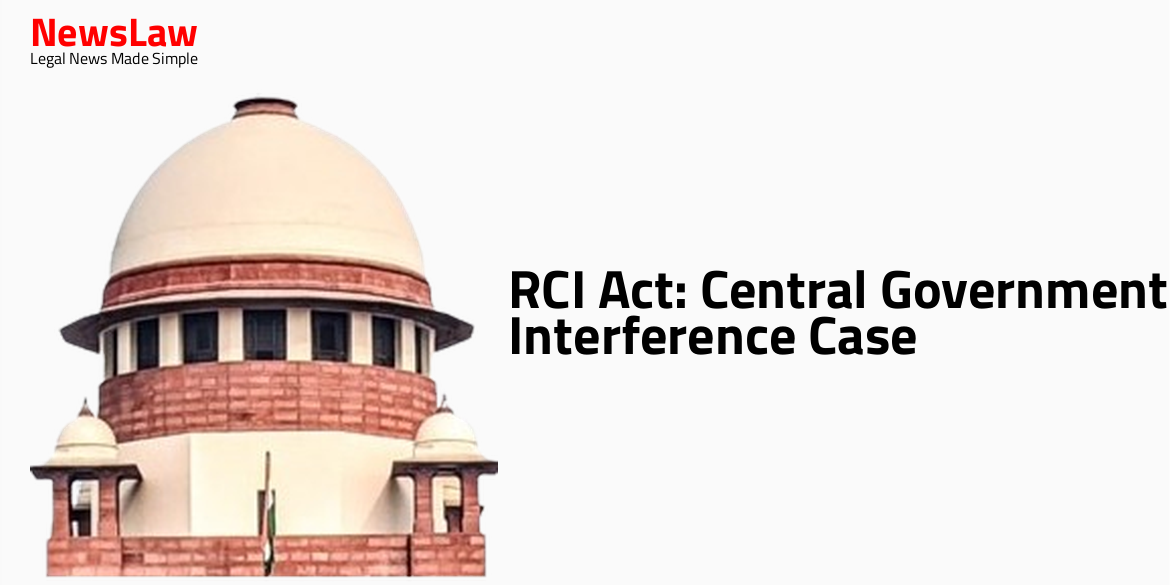A revised judgment has been issued by the Delhi High Court in the case concerning POCSO Act offences involving child sexual abuse material. The Court addressed the insufficiency of evidence to prove charges against the respondents, focusing on the interpretation of Section 15(2) of the POCSO Act. The revised judgment emphasizes the significance of the definition of ‘child pornography’ under the Act and the implications it carries. Stay tuned for more insights on this important legal development.
Facts
- Respondent 3 and Respondent 4 were discharged of offences under Section 15(2) of POCSO Act.
- The court found insufficent evidence to prove the charges against them.
Arguments
- Offences under Section 15(2) of the POCSO Act cannot be invoked against respondent nos.3 and 4 due to the absence of criteria to determine the age of children in the pornographic material.
- The ASJ-SC did not properly consider the testimonies of two expert medical witnesses.
- The ASJ-SC failed to acknowledge that there is no medical test available to determine the age of children in the pornographic material.
- The petitioner does not intend to challenge the trial proceeding under Sections 67B of the IT Act and 120B IPC.
Analysis
- The learned ASJ-SC disregarded statements of two doctors opining that some persons in videos were children as there was no medical test for age determination.
- Subjective satisfaction regarding appearance of persons in sexually explicit material is sufficient for it to be considered child pornography under Section 2(da) of the POCSO Act.
- Supreme Court’s judgment in P. Yuvaprakash case involved elopement, while present case involves recovery of sexually explicit material with prima facie appearance of children.
- At the stage of framing charges, the focus should be on whether there is enough material to presume accused have committed the crime.
- The view of the learned ASJ-SC in disregarding medical witness statements without contradictory evidence is unwarranted.
- Revisional powers under Section 401 Cr.P.C. allow third parties to invoke High Court’s jurisdiction when necessary.
- Concurrent power of revision under Section 397 Cr.P.C. is available to Court of Session and High Court for examining proceedings of inferior Criminal Court.
- The prayer to frame guidelines for POCSO Special Courts in cases involving CSAM of unidentified children deemed unnecessary due to existing legal provisions.
- The findings in ASJ-SC’s judgment are deemed to suffer from manifest illegalities and have caused a miscarriage of justice.
- The interpretation of Section 15(2) of the POCSO Act should consider the specific definition of ‘child pornography’ under Section 2(da) of the POCSO Act.
- Statements of two doctors constitute prima facie evidence at the stage of framing charges for an offense under Section 15(2) of the POCSO Act.
- Following steps under Section 34 of the POCSO Act with Section 94 of the JJ Act in situations with untraceable and unidentifiable victims would be impractical.
- Provisions of Sections 6 and 9 of the POCSO Act should align with the definition of ‘child’ under Section 2(d) of the POCSO Act, subject to determinations outlined in the JJ Act.
- The Kerala High Court held that strict proof is not required to determine the age of the minor in every case of child pornography.
- The Supreme Court clarified the revisional jurisdiction of a High Court under Section 397 read with Section 401 of the Cr.P.C., as a discretionary jurisdiction that can be exercised suo motu.
- In the case of Parthasarathi M vs State of Kerala, the Kerala High Court deliberated on the necessity for strict proof of age in child pornography cases.
- The Court emphasized that the identity of the child in CSAM need not be established by the prosecution as it is practically impossible.
- The definition of ‘child pornography’ under Section 2(da) of the POCSO Act was highlighted, stating that any material depicting sexually explicit conduct involving a child or appearing to depict a child falls under this category.
- The court opined that the definition of ‘child pornography’ is crucial in determining the application of Section 15 of the POCSO Act.
- It was noted that at the stage of framing charges, a prima facie inference of a child’s involvement is sufficient for material to be considered as child pornography.
- Contrasting the current case with P. Yuvaprakash, which was an appeal against a final conviction under the POCSO Act, the Court stressed the importance of understanding the definition and implications of child pornography.
- The judgment underscores the significance of the definition of ‘child pornography’ in deciding the application of relevant legal provisions.
- Revisional jurisdiction of the High Court can be invoked suo moto in cases of manifest illegality
- Revisional jurisdiction can be invoked in cases where the Courts have wrongly appreciated or refused to appreciate evidence
- Suo moto revisional powers of the High Court can be utilized in cases of finding of acquittal
- The Court invoked suo moto powers of revision under Section 401 of the Cr.P.C against the Judgment dated 29 April, 1986
- Notice was issued to the accused in accordance with Section 401(2) of the Cr.P.C.
Decision
- The Union of India is deleted from the array of the parties.
- The PIL is registered as a suo moto revision petition and listed before a learned Single Judge on 21 May, 2024.
- Ms. Aashaa Tiwari is appointed as Amicus Curiae to assist the learned Single Judge.
- A judgment dated 29 April, 1986 in Sessions Case No 31/86 was brought to the notice of the Court.
Case Title: TULIR CHARITABLE TRUST Vs. UNION OF INDIA & ORS. (2024:DHC:3837-DB)
Case Number: W.P.(CRL)-1196/2024



